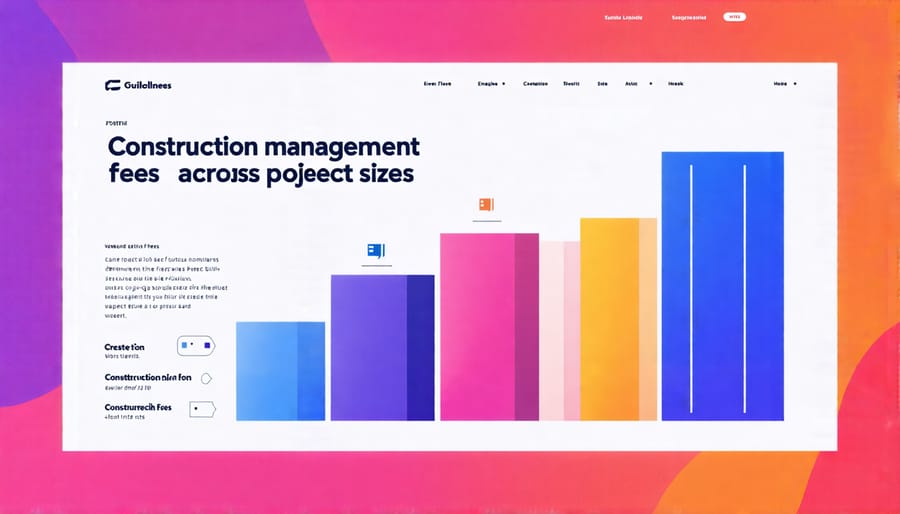Understand the key factors that impact construction management (CM) fees, such as project complexity, size, location, and scope. Familiarize yourself with industry-standard CM fee ranges, typically expressed as a percentage of total construction costs, which can vary from 5% to 15% depending on the project. Project owners should negotiate CM fees based on the specific services required, the firm’s experience and reputation, and the overall value they bring to the project. Establish clear expectations and deliverables in the contract to ensure transparency and accountability throughout the construction process.
Factors Affecting Construction Management Fees

Project Size and Complexity
The size and complexity of a construction project significantly impact the construction management fee percentage. Larger projects, such as high-rise buildings, hospitals, or industrial facilities, require more extensive coordination, planning, and oversight, leading to higher fee percentages. These projects often involve multiple stakeholders, intricate designs, and stringent regulatory requirements, demanding a greater level of expertise and resources from the construction management team.
Similarly, complex projects with unique architectural features, specialized materials, or challenging site conditions command higher fee percentages. These projects may require additional consultants, sophisticated scheduling and budgeting, and meticulous quality control measures. Construction managers must navigate the increased risks and responsibilities associated with these projects, justifying a higher fee to ensure successful delivery.
In contrast, smaller, simpler projects with fewer moving parts and less technical complexity typically have lower construction management fee percentages. However, even within the same project size, factors such as location, market conditions, and the construction manager’s reputation can influence the fee structure.
Geographic Location
Geographic location plays a significant role in determining typical construction management fees. Labor costs, which heavily influence CM rates, vary considerably across regions. In areas with higher costs of living, such as major metropolitan cities, construction management fees tend to be higher to account for elevated wages. Additionally, local regulations and building codes can impact the complexity of projects, leading to increased fees in regions with more stringent requirements.
Market conditions also contribute to regional variations in CM rates. In areas experiencing construction booms, high demand for construction management services may drive up fees. Conversely, in regions with slower economic growth or less development, competition among CM firms may result in lower rates. It’s essential for project stakeholders to research and compare fees specific to their geographic location to ensure they are budgeting appropriately for their projects.
CM Firm Experience and Reputation
Well-established construction management firms with a proven track record of successful project delivery often command premium fees for their services. These firms have built a strong reputation in the industry through years of experience, expertise, and consistent performance. They bring a wealth of knowledge and best practices to each project, ensuring efficient execution and risk mitigation. Clients are often willing to pay higher rates for the peace of mind that comes with engaging a reputable firm. Experienced construction managers from these firms have a deep understanding of the complexities involved in large-scale projects and can navigate challenges effectively. While premium fees may impact project budgets, the value delivered by top-tier construction management firms often justifies the investment.
Typical Fee Ranges
Percentage of Construction Cost
The percentage of construction cost charged by construction management firms typically ranges from 5% to 15%, depending on various factors such as project size, complexity, and location. For smaller projects with construction costs under $5 million, fees tend to be on the higher end of the spectrum, often between 10% and 15%. As project size increases, the percentage fee generally decreases. Projects with construction costs between $5 million and $20 million may have fees ranging from 8% to 12%, while larger projects over $20 million often see fees between 5% and 10%.
It’s important to note that these percentages are not set in stone and can vary based on the specific services provided by the construction management firm, as well as the unique challenges and risks associated with each project. Some firms may offer a sliding scale fee structure, where the percentage decreases as the construction cost increases. Others may charge a fixed fee or use a combination of percentage and fixed fees. When negotiating construction management fees, it’s essential to clearly define the scope of services and ensure that the fee structure aligns with the project’s needs and budget.

Lump Sum or Fixed Fee
In some construction projects, a lump sum or fixed fee structure may be used instead of a percentage-based fee. This approach involves the construction manager quoting a fixed price for their services, regardless of the total project cost. Lump sum fees are more common in smaller projects or those with well-defined scopes. The fixed fee typically ranges from $10,000 to $100,000 or more, depending on the project’s complexity and duration. This structure provides cost certainty for the client but may limit the construction manager’s flexibility if the project scope changes significantly. When considering a lump sum fee, it’s essential to clearly define the construction manager’s responsibilities and deliverables to avoid misunderstandings and ensure a successful project outcome. Clients should also consider the construction manager’s experience and track record when evaluating the appropriateness of a fixed fee structure for their project.
Hourly Rates for Additional Services
In some cases, construction management contracts may include provisions for additional services beyond the base scope of work. These services are typically billed at hourly rates, which can vary depending on the specific expertise required and the complexity of the tasks. Common hourly rates for senior construction managers range from $150 to $250 per hour, while rates for project managers or engineers may fall between $100 and $200 per hour. Support staff, such as administrative personnel or CAD technicians, may be billed at rates ranging from $50 to $100 per hour. It is important to clearly define the scope of these additional services and establish a budget to avoid unexpected costs. When negotiating the terms of a construction management contract, it is advisable to discuss and agree upon these hourly rates for additional services to ensure a smooth and transparent working relationship throughout the project.

Negotiating Construction Management Fees
When negotiating construction management fees, it’s essential for project owners to strike a balance between obtaining competitive rates and ensuring the construction manager has sufficient resources to deliver a successful project. Begin by researching industry benchmarks for similar projects in terms of size, complexity, and location to establish a baseline for negotiations.
During discussions, focus on the value the construction manager brings to the table, such as their expertise, experience, and ability to mitigate risks. Be transparent about your budget constraints and objectives, allowing the construction manager to propose solutions that align with your goals while maintaining their profitability.
Consider alternative fee structures, such as incentive-based arrangements or phased payments tied to milestones, which can help align the construction manager’s interests with your own. These structures can also provide flexibility in managing cash flow throughout the project.
When evaluating proposals, look beyond the bottom-line fee and assess the construction manager’s approach to staffing, communication, and problem-solving. A slightly higher fee may be justified if it comes with a more experienced team, proactive risk management strategies, and a proven track record of delivering successful projects.
Ultimately, the key to negotiating fair construction management fees lies in open communication, mutual understanding, and a shared commitment to project success. By fostering a transparent and collaborative relationship with your construction manager, you can work together to find a fee structure that benefits both parties and sets the stage for a smoothly executed project.
Conclusion
In conclusion, understanding typical construction management fees is crucial for effective project planning and budgeting. Construction management fees can vary significantly based on project complexity, location, and the scope of services provided. By familiarizing themselves with standard fee structures, such as percentage-based, fixed, or hourly rates, construction professionals can make informed decisions when selecting a construction manager and negotiating contracts.
It is essential to consider the factors that influence construction management fees, including project size, duration, and the level of expertise required. Engaging in transparent discussions with potential construction managers and thoroughly reviewing their proposals can help ensure that fees align with project requirements and budgetary constraints.
By having a clear understanding of typical construction management fees and the value they bring to a project, stakeholders can allocate resources effectively, minimize unexpected costs, and foster successful collaborations with their construction management partners. Ultimately, investing time in researching and negotiating appropriate construction management fees can contribute to the overall success and profitability of construction projects.

